
What’s scarier for Canadian communities — floods, or flood maps?
When maps showing areas most likely to flood are outdated, it puts people and property...
From a bridge above train tracks in New Hazelton, B.C., supporters of the Gitxsan Nation watched on Nov. 18, as Gitxsan children and teens tossed marshmallows at a fleet of heavily armed RCMP units descending upon the tiny town in the northwest part of the province.
“They had tactical units, sniper teams and riot suppression gear and we had children with marshmallows,” Kolin Sutherland-Wilson, a Gitxsan member of Wilp (house group) Git’luuhl’um’hetxwit, told The Narwhal in an interview.
“That overwhelming use of force is nothing less than terrorism. They were trying to instill fear in us.”
Members of the Gitxsan Nation had set up a blockade that day on the CN rail tracks in support of Wet’suwet’en land defenders and supporters who were arrested after Wet’suwet’en hereditary chiefs enforced an eviction of Coastal GasLink workers preparing to drill under Wedzin Kwa (Morice) River.
“They were simply bombarded by Gitxsan children with marshmallows, they were bombarded by Gitxsan aunties with insults,” Sutherland-Wilson said. “And they stood around dumbfounded because they were geared up to fight a bunch of Indians. They were geared up for war and all they found were peaceful people.”
The action is symbolic. In 1986, the federal fisheries department brought in a special enforcement squad to stop Gitxsan from “illegal fishing” in Gitwangak (Kitwanga) and when the squad tried to push through a line of women and children, everyone around pelted them with marshmallows. With reporters and television crews watching, the officers backed off. It’s known as the “marshmallow war.”
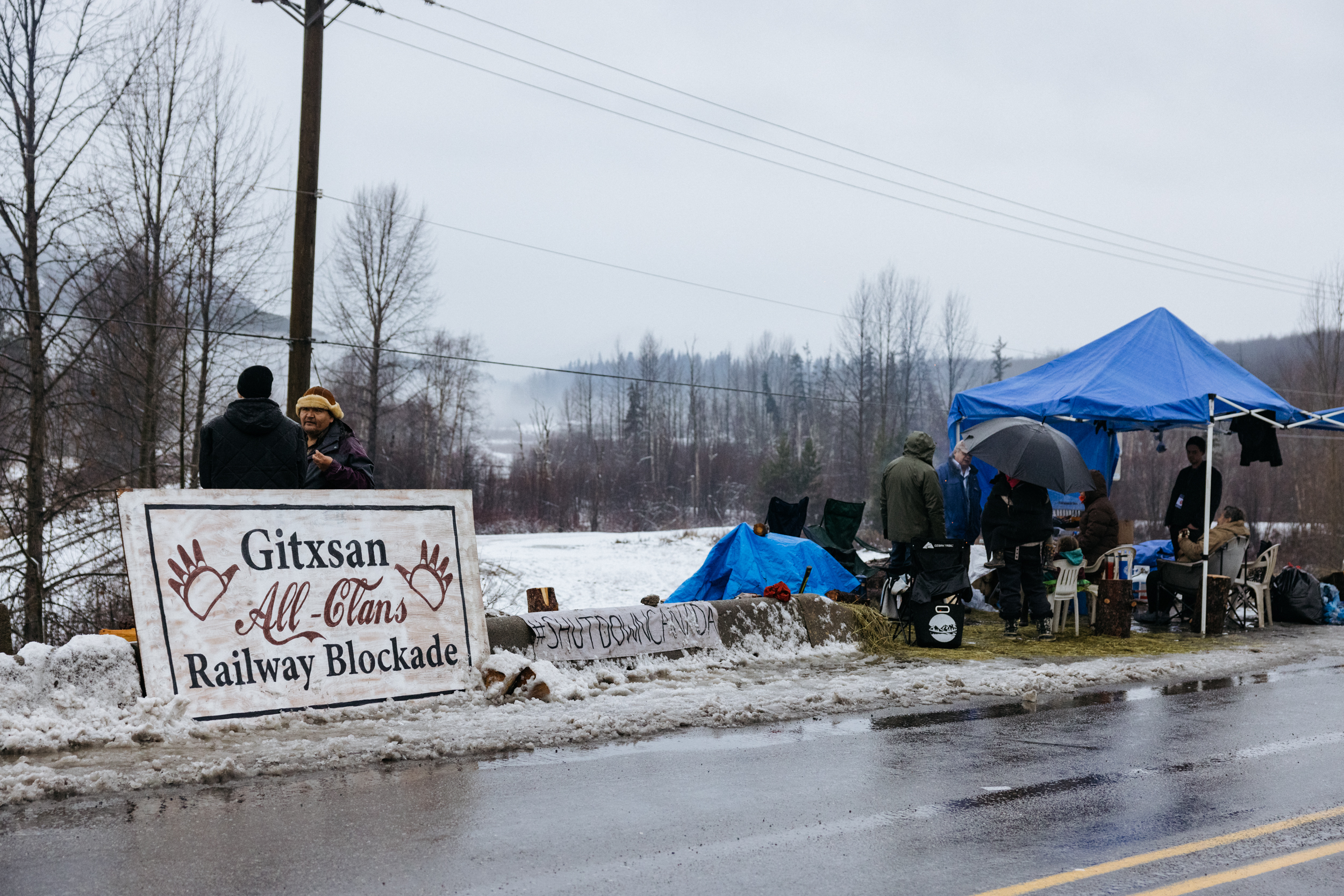
Of its heavily armed response and arrests on Wet’suwet’en territory, the RCMP told The Narwhal its “threat assessment of the situation had been heightened by publicly available rhetoric on social media by the protesters calling for ‘war’, which was a change from previous protests in the area.” The RCMP declined to comment further on its response to the Gitxsan rail blockade.
“Police operate at arms-length from government and the solicitor general does not direct police operations,” the Ministry of Public Safety and solicitor general told The Narwhal in an emailed statement. “People can take their concerns or complaints regarding allegations against the RCMP directly to the RCMP ‘E’ Division, or complaints can be made to the Civilian Review and Complaints Commission for the RCMP.”
The Gitxsan support was only one of a series of solidarity actions, including rallies, road and rail blockades, flaring up across the country in support of the Wet’suwet’en land defenders.
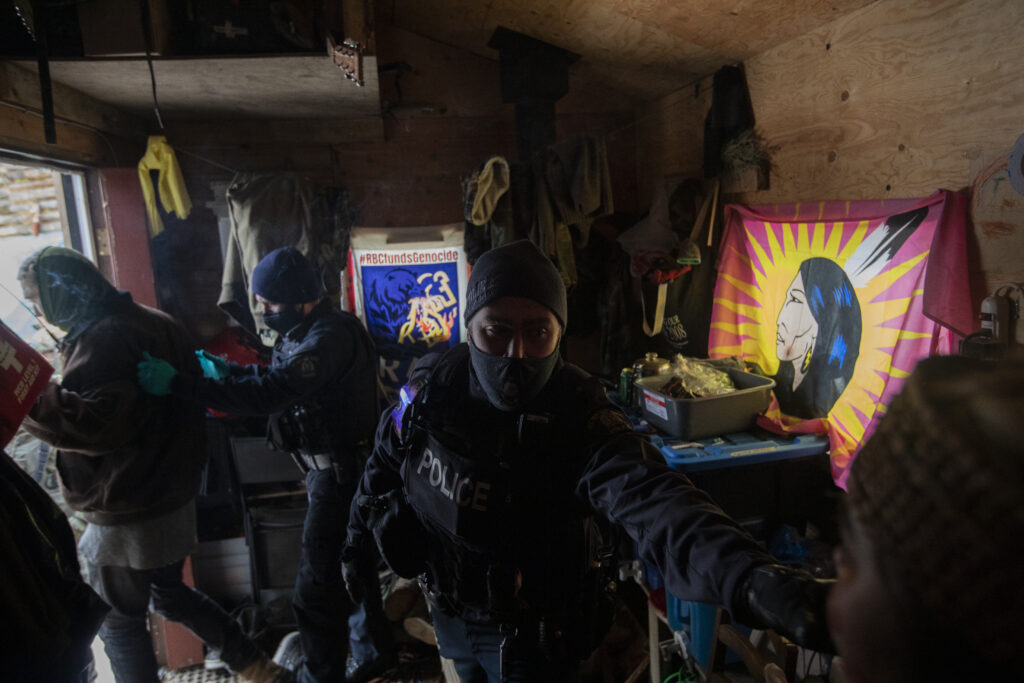

Nearly every major city in Canada has since seen rallies, marches and solidarity actions since RCMP conducted a series of arrests on Wet’suwet’en territory last week, including two journalists, Michael Toledano and Amber Bracken, who was on assignment for The Narwhal. Mohawk supporters in Ontario have been leading rolling blockades on the province’s busiest thoroughfare, supporters blocked a major bridge in Edmonton and other solidarity actions continue to unfold.
In the northwest, numerous First Nations, including Haida and Heiltsuk, have issued statements of support, condemning the RCMP and B.C. Premier John Horgan for using what they described as violent and military-style tactics in enforcing an injunction against land defenders.
“We are unwavering in our support of the Wet’suwet’en Hereditary Chiefs and their fight for their lands, title and self-determination, and we call on Premier Horgan and the B.C. NDP government again to disarm this conflict and uphold Wet’suwet’en Rights and Title,” a Heiltsuk Nation statement reads.
“We stand with our Wet’suwet’en relatives in exercising their inherent responsibility to protect their sacred headwaters,” Gaagwiis Jason Alsop, president of the Haida Nation, wrote in a statement. “The use of a militarized police force against unarmed people and the suppression of communications and media are violations of human rights. The world is watching and it is shameful what is happening.”
Alsop added the Haida are sending people and supplies to unceded Wet’suwet’en territory in support.
The Coastal GasLink pipeline, owned by TC Energy, would span 670 kilometres, connecting natural gas sources in northeast B.C. with the LNG Canada facility currently under construction in Kitimat.
“If anyone is physically harmed as a result of RCMP involvement, that will become a part of our legacy. This was not a part of the LNG agreement we signed.”
Haisla hereditary Chief Wilthboon
Members of the Haisla Nation, including those with shares in LNG Canada, have also publicly declared their solidarity with the Wet’suwet’en. The Narwhal was granted permission, through Haisla alut (protocol) to share the words of a Haisla hereditary chief.
“I am Chief Wilthboon of the Eagle Clan and daughter of Chief Gps’golox of Henasila,” she said in a video statement. “I am calling upon the Haisla Nation traditional leadership, to uphold our tribal treaty commitments with the Wet’suwet’en dating back to 1991.”
“If anyone is physically harmed as a result of RCMP involvement, that will become a part of our legacy. This was not a part of the LNG agreement we signed.”
Sutherland-Wilson said the support between nations gives him strength.
“We realize we’re not the only people in this fight, and we’re all coming together,” he said. “All the ancient peoples of the North are coming together.”
After 50 days of occupying a Coastal GasLink pipeline worksite on Gidimt’en clan territory in an effort to prevent drilling under the Wedzin Kwa (Morice River), land defenders enforced the eviction order, which was originally issued by the Wet’suwet’en hereditary chiefs on Jan. 4, 2020.
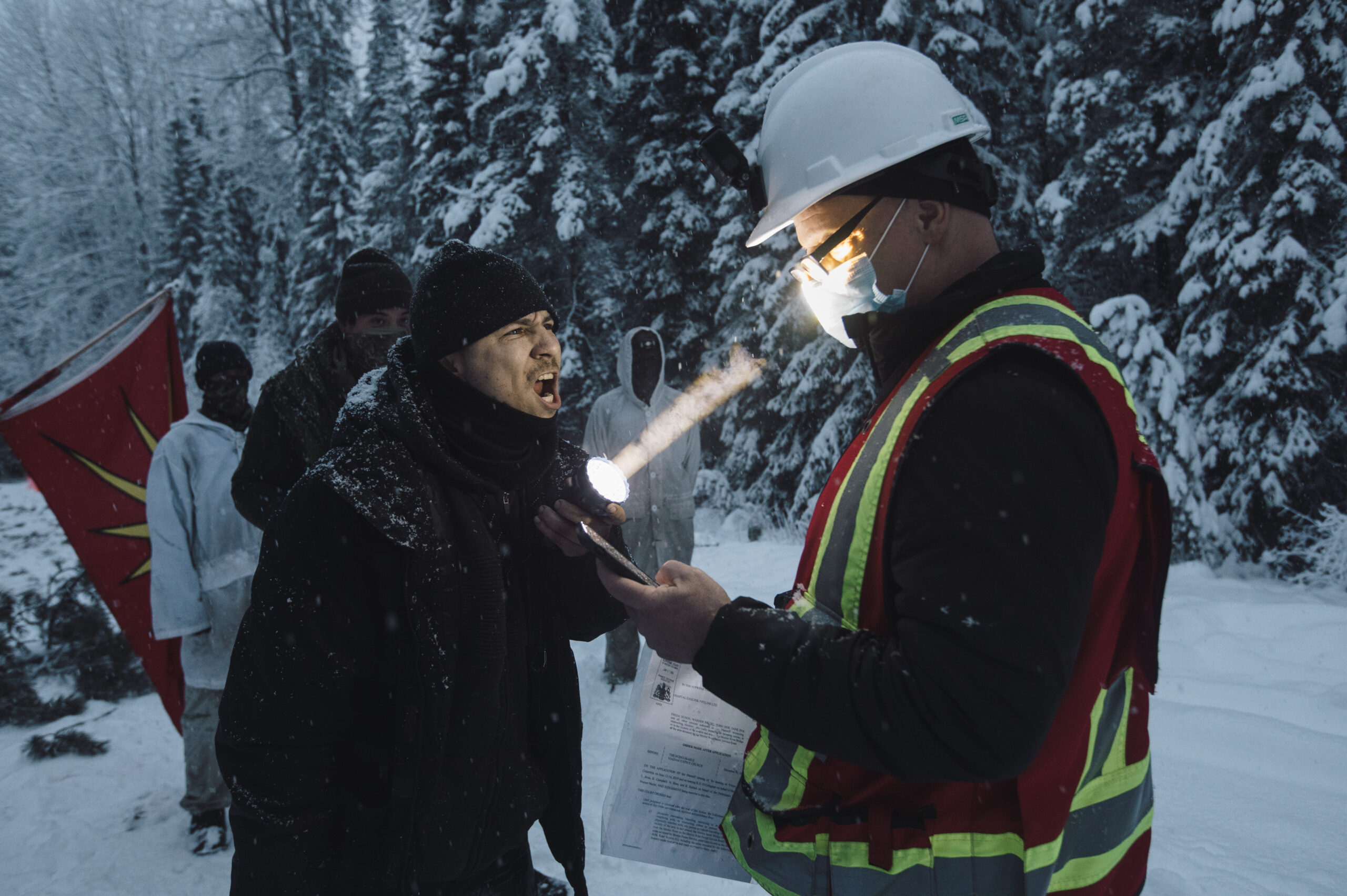
While TC Energy has agreements with Wet’suwet’en elected chiefs and councils, the hereditary chiefs maintain their jurisdiction predates colonial law, when provincial and federal governments forced Indigenous people onto reserves and set up the band government system. In 1997, a historic Supreme Court of Canada decision ruled that the Gitxsan and Wet’suwet’en had never given up their Rights and Title to the land.
Sleydo’ Molly Wickham, Gidimt’en Camp spokesperson, acting on the authority of hereditary chief Woos, provided Coastal GasLink workers 10 hours to leave the territory and after only a handful left, land defenders dug up the Morice River Forest Service Road with an excavator, closing the only road access to two work camps housing more than 500 people.
“It just got to the point that we’d had enough and it seemed like the right time,” she told The Narwhal in an interview before the arrests. “We cannot afford for Wedzin Kwa to be destroyed.”
According to a Tyee report, the company did not tell all of its workers, housed at the camps, about the evacuation order.
“I don’t know about everybody, but a lot said they would have left,” a worker, who asked to remain anonymous for employment reasons, told The Tyee at the time.
On Nov. 18 and 19, tactical RCMP units conducted the arrests, describing it as a “rescue and enforcement operation” under the jurisdiction of an injunction against land defenders that was granted to Coastal GasLink in late 2019.
“The judicial system is being hijacked by politics,” Wet’suwet’en hereditary chief Dsta’hyl Adam Gagnon told The Narwhal in an interview. Gagnon explained that B.C. Supreme Court Judge, Marguerite Church, who granted the injunction, ignored Indigenous Rights and Title that are protected under federal law.
“What she basically stated there is that [Coastal GasLink] stands to lose a lot more than Wet’suwet’en financially, therefore she was granting the injunction,” he said. “She put profit before people. That’s disgraceful and goes against the Charter of Rights, goes against the constitution of Canada. It goes against everything that Canada stands for. She is single-handedly committing genocide here against all of the Wet’suwet’en.”
The arrests of journalists Bracken and Toledano were condemned by media outlets and organizations, including the Canadian Association of Journalists, and garnered international attention, but as Bracken warned in a Tweet shortly after being released from custody, the public should not lose sight of the story unfolding on Wet’suwet’en lands.
“A civil injunction was just enforced at the end of a gun, literally,” she wrote. “It’s no coincidence media access is especially belaboured here.”
As The Narwhal’s Stephanie Wood recently wrote in an article for the first National Day for Truth and Reconciliation, the violence against the Wet’suwet’en is one of many examples of violence against Indigenous Peoples across the country. She described her internal conflict on how to tell the story, whether to open with an example of violence, such as non-Indigenous commercial fishermen’s attacks on Mi’kmaq fishermen as RCMP stood by and watched, or joy, such as Wickham cuddling with her infant while doing an interview over Zoom.
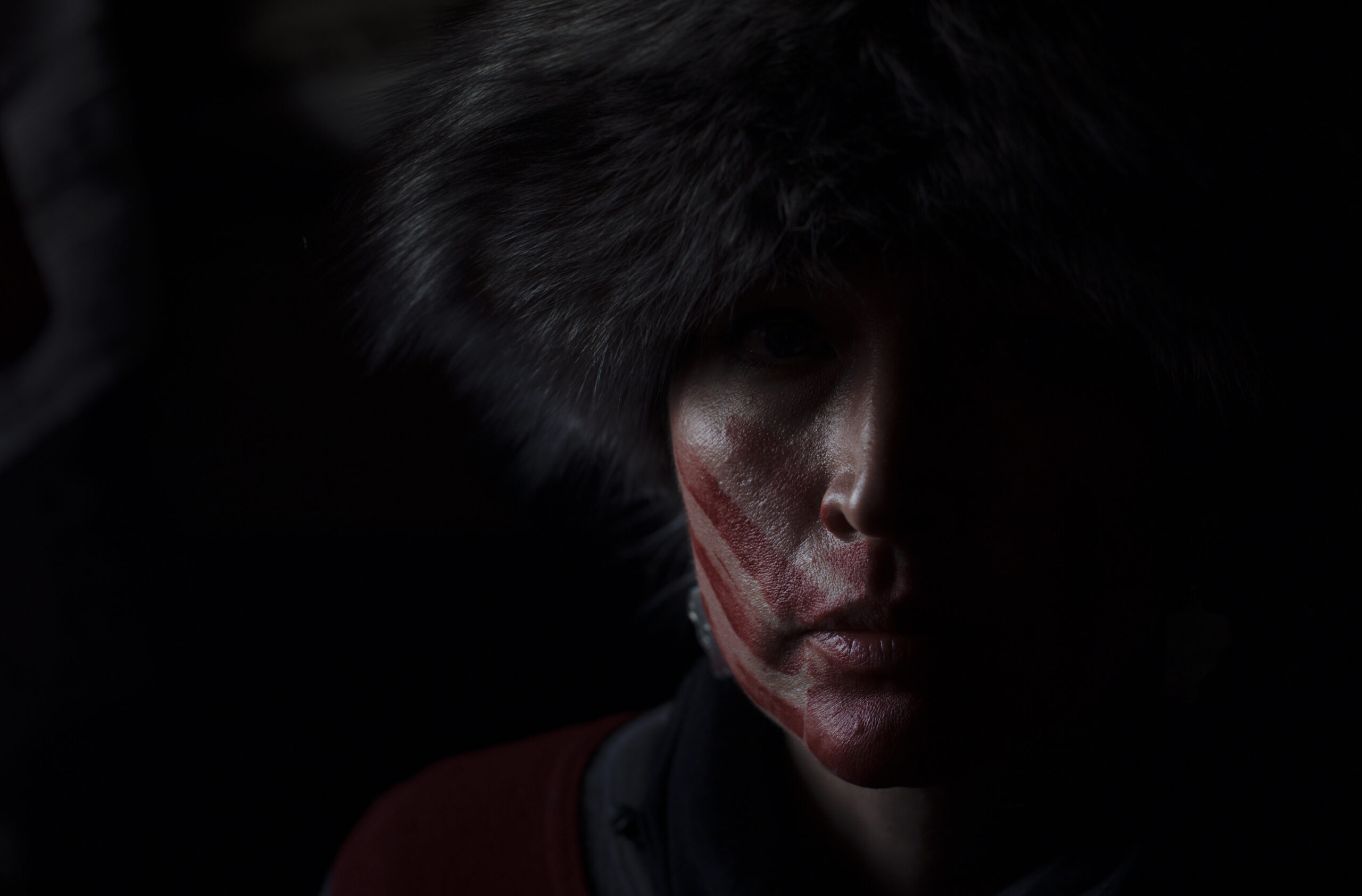
“But then I stopped and wondered if spotlighting her child could make Molly feel unsafe, could subject her and her child to online harassment or worse, and maybe I shouldn’t mention the infant at all.”
“I got a sinking feeling in my gut,” Wood wrote. “That thought — worrying for the safety of an Indigenous child and mother just for being mentioned in the media — illustrated exactly what I was trying to get at. The laboured energy that Indigenous land defenders put into trying to protect their personal safety as they fight to assert their rights. The threats they face, the precautions they have to take and the deeply entrenched double standards for violence in this country.”
The Gitxsan have not been blocking the rail line since Nov. 18. Instead, they have been showing solidarity for their Wet’suwet’en neighbours from the highway at a bridge over the tracks. RCMP continue to maintain an around-the-clock presence, which Kolin Sutherland-Wilson said is disturbing to many members of the community, who see RCMP as a symbol of oppression.
“They are simply doing their job, but it is a very unethical, immoral job rooted in genocide,” he said.
Denzel Sutherland-Wilson, younger brother of Kolin, was arrested Sunday and released shortly after on charges of mischief.
“I was gasping for air,” Denzel said, showing where his wrists were scraped and bruised by handcuffs when RCMP officers arrested him on Sunday. “It’s a pretty scary feeling.”
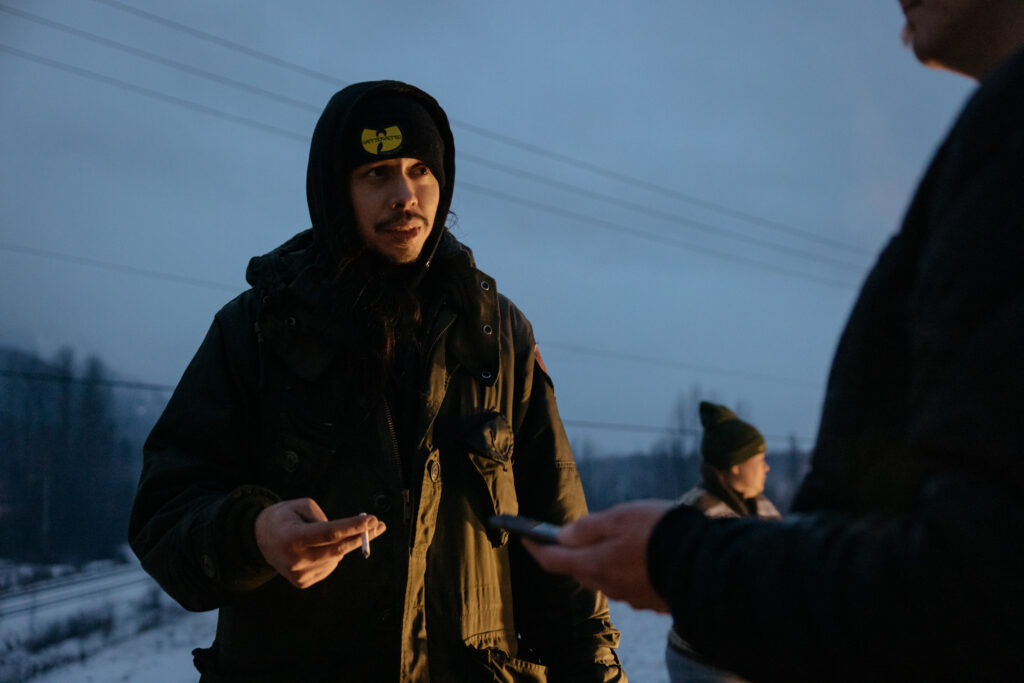
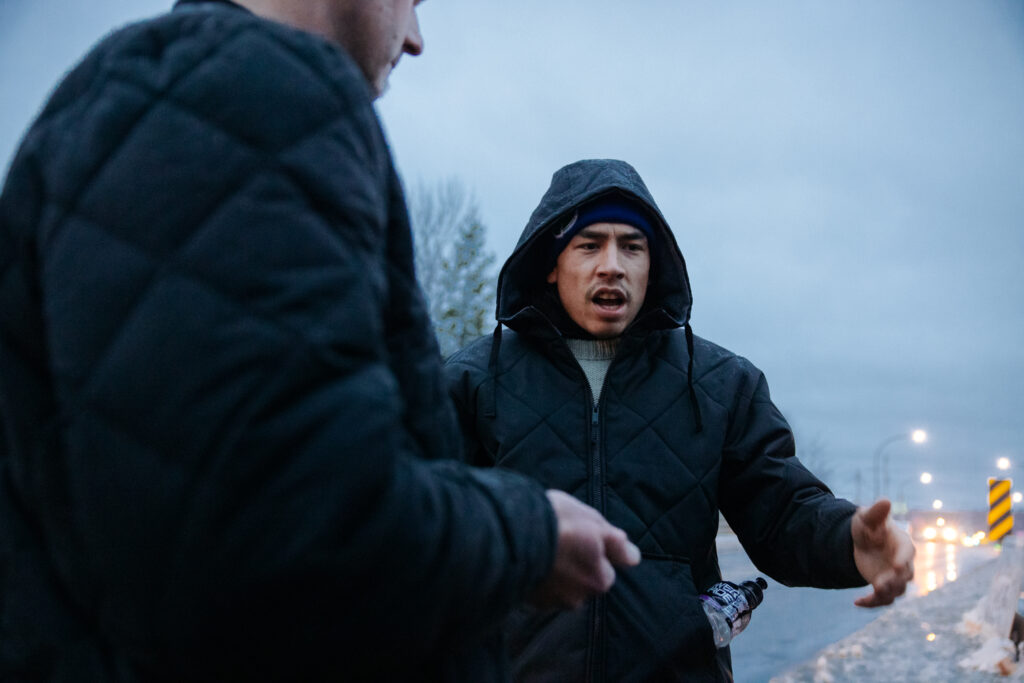
Denzel was seen “placing obstacles on the tracks,” according to an RCMP spokesperson. He walked briefly along the rail line and after RCMP officers came toward him, he moved off the tracks and onto an embankment where the officers pinned him to the ground. He was arrested and released shortly after on charges of mischief.
“We are not here to get hurt, we are not here to get killed,” Kolin said. “We are here simply to hold the people at the top of the Canadian government accountable, because they have a responsibility to uphold Crown relations with sovereign Indigenous Peoples.”
“All the RCMP are doing right now is digging themselves into a hole. All the Solicitor General of B.C. is doing right now is digging himself into a hole. All that Justin Trudeau is doing right now is digging himself into a hole because they will have to be held accountable for this. People will not be able to look away from these atrocities.”
He added the Gitxsan, like their Wet’suwet’en neighbours, are peaceful but determined.
“We simply talk from the heart. We simply put our boots on the ground. We simply fight the fight we have to and we work hard to keep ourselves safe, to keep our families safe, to keep our land safe. That’s why we have nothing to fear because we only speak the truth.”
Updated Nov. 26, 2021: This article was updated at 5:46 pm PT to correct the spelling of the name of Chief Wilthboon of the Eagle Clan and also correct a spelling error in a quote that incorrectly identified Chief Wilthboon as the daughter of Chief Yupsgulth of Henasila. The quote should have stated that Chief Wilthboon is the daughter of Chief Gps’golox of Henasila.
Enbridge Gas will face Waterloo Region in a hearing before the Ontario Energy Board to renew an agreement that would allow the company to continue...
Continue reading
When maps showing areas most likely to flood are outdated, it puts people and property...

We’re suing the RCMP for arresting a journalist on assignment for The Narwhal. It’s an...

As glaciers in Western Canada retreat at an alarming rate, guides on the frontlines are...